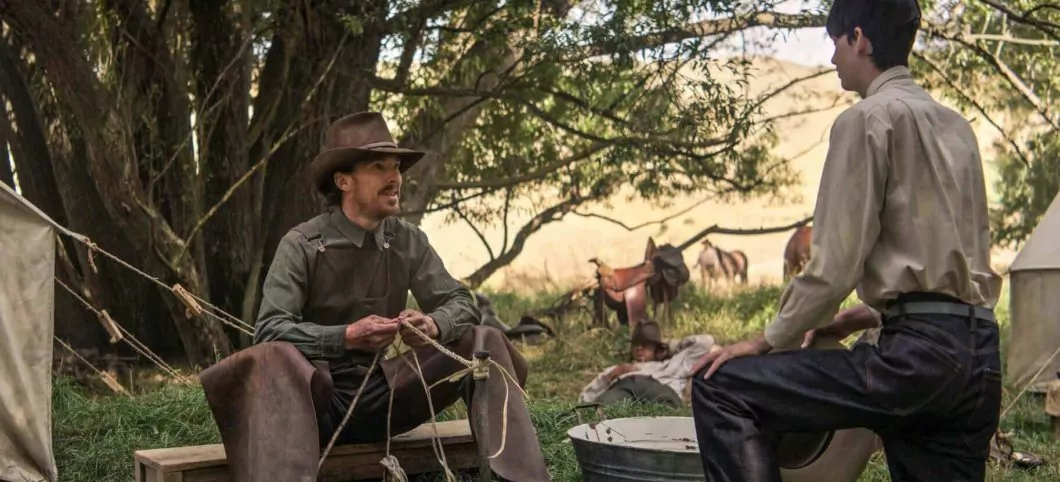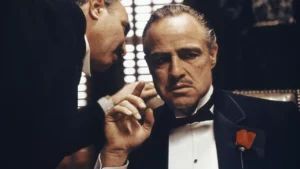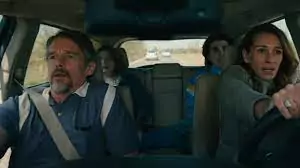Based on the 1967 novel of the same name by Thomas Savage, ‘The Power of the Dog’, is a haunting drama set against a Western backdrop
The Power Of The Dog Movie Cast
- Benedict Cumberbatch as Phil Burbank
- Kirsten Dunst as Rose Gordon
- Jesse Plemons as George Burbank
- Thomasin McKenzie as Lola
The Power Of The Dog Movie Review
Based on the 1967 novel of the same name by Thomas Savage, ‘The Power of the Dog’, is a haunting drama set against a Western backdrop. Set in Montana in 1925, the film follows the Burbank brothers, Phil (Benedict Cumberbatch) and George (Jesse Plemons), who are rich ranchers. On one of their cattle drives, they come across Rose (Kirsten Dunst), who runs a small restaurant, and her son, Peter (Kodi Smit-McPhee). On their first encounter, Phil ridicules Peter for some of his effeminate characteristics, resulting in an outburst of tears by Rose. George being the kinder of the two brothers decides to solace the crying mother.
Soon enough, it is revealed that George had married Rose to the surprise of his brother, Phil. Phil who is in a habit of enjoying unparalleled authority at his mansion-like home and ranch now feels unsettled by this decision of his brother’s. Rose’s sudden arrival into the lives of the Burbank brothers sets off a new struggle for power (which only exists in the mind of Phil) and he bullies Rose in every way possible, only to emerge victorious in the end. Phil’s cold gaze towards Rose takes a breather when he decides to take Peter (who just returned from med school) under his mentorship and turn him into an honest rancher. In his own words, Phil doesn’t want Peter’s mother to make a “sissy” out of him.

The Engaging Contrast between Characters in The Power Of The Dog
While being brothers, Phil and George are contrasting characters. George Burbank is a kind, polite and gentlemanly figure whereas his brother, Phil, is a rough, outdoorsy, dirt-loving rancher whose idea of a good date will probably rest around taking the horses for a ride on a glamourous sunny morning. Phil, although, is not a fun-loving guy. He is tough, ruthless and if there is one thing which he enjoys the most, is being at the top of the power hierarchy in every room he graces with his presence. He commands the respect of his employees on the ranch and at moments where he is not given the respect, he tends to snatch it away by a show of authority.
While a whistle from Phil is enough to grab the attention of even animals at the ranch, a polite request from George might go unheard by the ranch workers. For a man who even climbs the stairs two steps at a time as if even the stairs pose a challenge to his will, Phil is a man who demands to be taken seriously by everyone around him. On the contrary, his brother George, a humble, kind man, with his polite demeanour, presents an opposing image to the show of masculinity carried around by Phil on most occasions. The movie is ridden with such contrasting images. Even with its Western setting, the movie tends to achieve the same by presenting a conflicting backdrop for the characters and their personalities.
But even with his horse-beating persona (yes, he beats a horse in one of the scenes), to decode Phil’s character straight away based on the pretence he puts up will be a mistake. And the beauty of the movie and its characterization rests on the fact that the same can be said about the rest of the characters as well. Rose, while becoming a victim of the humiliation she is put through by Phil, yearns to push his back against the wall for once. Peter, also a victim of similar humiliation by others on the ranch and Phil, holds more cards in his sleeves than he reveals. The layered characterization, added to by the intensity of the acting performances, contributes to the vital drama required by the movie’s setting.
The Play of Power and Emotions in The Power of The Dog
In one of the strongest scenes of the movie, we see a struggling Rose trying to nervously play a melody on the piano and a skilled Phil trying to outplay her by repeating the same melody on his banjo with the precision of a hunter determined to chase down his prey. While this sounds comical in writing (which it is, to some length), the scene portrays the deeply psychological level at which the play of power and emotions takes place between the characters in the movie. The movie’s greatest strength is its exploitation of the layered characterization, providing it with an opportunity to explore fertile themes of sexuality, revenge, love, companionship and power against the barren backdrop of a Western setting.
The haunting music of violins, accompanied by the visuals of the nearly deserted land and mountains, adds to the chilling play of power and emotions between characters. Similar to the ominous sound of the violins, the camera moves at a snail’s pace, at its leisure, to provide enough opportunity for the viewer to grasp what’s unfolding on the screen. But with ample time, the movie tends to reveal very little with the words and subtlety becomes its greatest strength.
The dialogues cover more than they reveal and if you don’t keep your eyes attentive, there are chances you might miss a thing or two. Much to the credit of Jane Campion (Director) and Ari Wegner (Cinematographer), the movie provides some great visuals to enjoy, mixing the right amount of warmth required for a movie that deals with human relationships, with the unnerving, chilling coldness exuded by the characters at moments. Much like a sandy desert, the movie holds the ability to be warm at one moment and be utterly cold at the next.
The Movie Culture Synopsis
‘The Power of the Dog’, with its slow-paced suspense-filled narrative, builds on the back of the contrasting characters it puts forth. Each scene between the characters displays a dozen dynamic changes taking place between their relations. By the end, we not only witness the dynamics of relations changing between the characters alone but a similar change taking place within each character as well. ‘The Power of the Dog’ treats its characters and narrative like fine wine; it takes its time to age but when finally taken out of the barrel, it’s definitely worth the wait.
Gripping performances, melancholic music, haunting raw cinematic treatment and intense acting performances make ‘The Power of the Dog’ a great piece of cinema which although makes you wait a bit at the beginning (like all good things do), rewards you in the end amply and undoubtedly.



